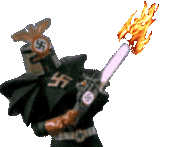aleph
Arcane
- Joined
- Jul 24, 2008
- Messages
- 1,778
You are right, "because of fun" is not an argument. The idea that games should have anything to do with fun is absurd, as you rightly have pointed out.
My point was that to say "something is fun" is not a substantial argument, in that it doesn't bring forth any sort of objective criteria for which the argument can be evaluated. Something being fun, as the Codex has made abundantly clear throughout the whole process of any game ever made, is subjective to the person and as such, an unreliable measure of the validity of the argument. To make a proper argument, one must utilize standards that many, if not most or all people, would accept as valid. Without agreed standards and measures, it is impossible to make any sort of reasoned argument for or against it.
But, obviously it seems I have to spell out everything for the
Don't you think that your inability to detect sarcasm makes you
 ?
?



























 Would brofist, yet I have no fists.
Would brofist, yet I have no fists.


